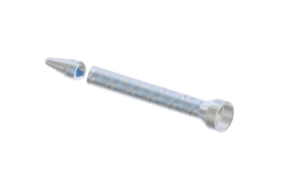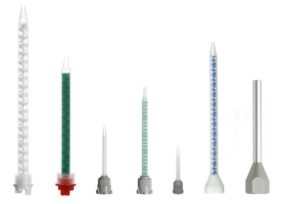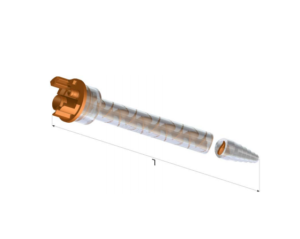Many types of modern adhesives require both exact mix ratios and thorough mixing to be effective. Proper mixing is often as important or more important than mixing ratio. This has led to the advent of precise machinery for metering of adhesive components, as well as devices to ensure proper mixing. Two types of mixers are commercially used – dynamic and static mixers.
Dynamic mixers make sense for some applications especially where the two components are not very chemically miscible but require frequent cleaning and upkeep to prevent buildup of cured adhesive. Static mixers are often disposable and can provide the necessary mixing at a lower cost.
Why Static Mixers?
Static mixers are an attractive option for a number of reasons. For one, they require no energy to operate – the energy used for mixing essentially comes from a drop in flow-rate of the fluid passing through them. Adjusting the size of the mixer tip can effectively change the flow to the desired rate. Static mixers offer an upgrade to hand-mixing both in increased consistency of results and reduced addition of air to the mixture. Static mixers are generally less expensive than dynamic mixing equipment and are well-suited to applications which require multiple adhesives, as well as to mobile equipment used in large warehouses. They also make a good fit for automated equipment and for adhesives with mix ratios up to 10:1.
Types of Static Mixers
Static mixers can take any number of forms, each suited to particular applications and with unique advantages and disadvantages. These include in-line mixers, where components are placed as a permanent part of the dispensing line, and static-dynamic mixers, which have moving parts but are not powered. Disposable bayonet mixers, however, are by far the most common and widely applicable. Disposable static mixes take the form of a nozzle that attaches to either meter mix and dispense (MMD) or handheld dispensing equipment. Their internal components can vary greatly depending on the needs of the application. The most common are the helical type and the box chamber type. Disposable static mixers are designed to be thrown away after use which can be cost effective compared to the flushing and cleaning necessary in non-disposable mixers. They also make sense for equipment which will handle multiple adhesive types.
Choosing a Static Mixer
 The type of static mixer needed will depend on a variety of factors. The number and type of elements, nozzle construction and nozzle diameter will all vary depending on application needs.
The type of static mixer needed will depend on a variety of factors. The number and type of elements, nozzle construction and nozzle diameter will all vary depending on application needs.
Dispensing equipment – One key consideration is if meter mix and dispense (MMD) equipment or handheld equipment will be used. Disposable mixers are more frequently used for handheld equipment and are compatible with various cartridge sizes. MMD applications may also use static mixers, particularly when adhesives are being changed or other mixing options aren’t feasible.
Shot Size – A larger shot size/faster dispensing will require fewer mixing elements and a larger diameter opening. Because a larger diameter usually means less-efficient mixing a balance is required between the two. Smaller shot sizes require more mixing elements and smaller diameters for an ideal mix.
Shot Frequency – Constant dispensing makes mixing easier, allowing fewer mixing elements and larger diameters. Intermittent shots require more elements to ensure proper mixing.
Adhesive characteristics – Thicker adhesive components require larger diameter openings to flow and mix properly. The difference between component viscosities will also affect the number and type of elements needed.
Materials used to manufacture the mixer nozzle will also depend on type of adhesive being mixed and maximum pressure it will need to withstand. The number and shape of mixing elements is also critical to proper mixing. Helix-shaped components are the most common, but other profiles are available that may be needed for particular mixes. The trade-off between mixing elements and minimum flow-rate will determine an exact configuration. All of these elements need to be considered when choosing a nozzle type and testing is recommended to insure proper results.
 Shop our range of static mixers here.
Shop our range of static mixers here.
The content for this month’s blog post was provided by Gluespec® – a partner of Ellsworth Adhesives.
Gluespec helps engineers to discover adhesives and other materials for their industrial applications.


